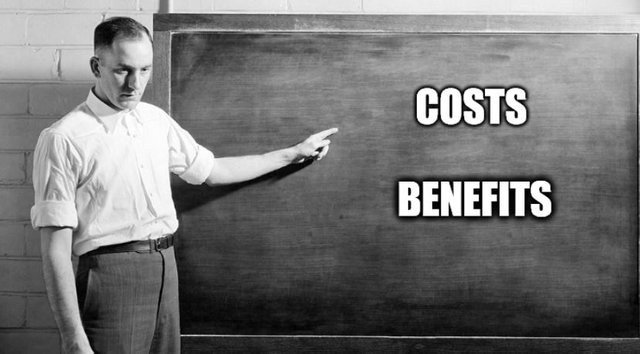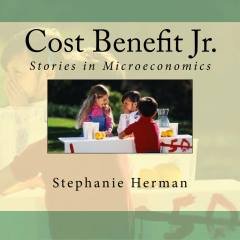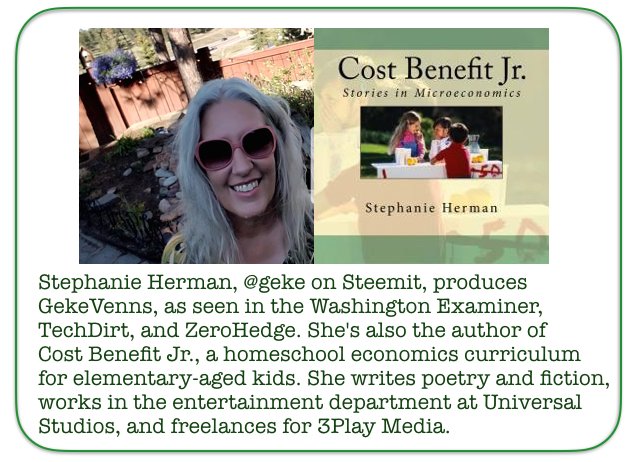Teaching kids about costs and benefits

When I wrote Cost Benefit Jr.™: Stories in Microeconomics, my goal was to show my kids that the world is balanced by a creative tension between costs and benefits. I was less interested in teaching them how an economy works; my oldest was only eight years old at the time. But I was very interested in teaching them, through stories, how people make choices.

At eight, my oldest son could usually recognize his benefits in any given situation requiring a decision, but he rarely recognized the accompanying costs. And while he could sometimes see what his own incentives to act might be, he hardly ever saw that other people's actions and behaviors are also governed by incentives.
I figured that by cutting to the chase regarding costs and benefits, I'd be able to stop explaining the specifics to my kids regarding every situation, and let them apply their understanding of costs/benefits to situations as they experienced them.
We know it's wrong, for example, to be jealous of what others have. But it's easier to let go of that jealousy when you understand there are hidden costs to every obvious (seen) benefit your friends are enjoying down the street. Hidden costs are a huge eye-opener for kids, and realizing they exist there, just under the surface, can diffuse a lot of interpersonal conflict in the minds of our kids.
Costs and benefits bracket every choice we make, from which brand of toothpaste to buy... to which person to marry... to how we spend our free time. Once we understand that, we can make informed choices; we can make good choices.
Even young children behave “economically,” and not just in choosing how to spend an allowance. Kids respond to incentives in their behavior toward friends. They compete for things they value. And even the most well-behaved children evaluate costs and benefits when determining the wisdom of following rules.
These features of decision-making are hallmarks of free-market economics. And though we might admit we’re economic beings out in the world, we tend to believe that we’re non-economic at home. After all, parents don’t compete with their children for food at the dinner table. But even “socialist” values like sharing, helping, and giving are, at their roots, economic. Sharing, for example, assumes ownership and is governed by subjective values and incentives. We never wholly self-sacrifice; we seek out mutually beneficial acts of charity. Sharing food with family members may seem like good socialism, but how much would we hurt – how much would it cost us – if the people we love went hungry?

And we need to recognize that all decisions are economic decisions.
In an article published a while back in Markets & Morality, associate professor John E. Stapleford cited frightening research by Frank, Gilovich & Regan that found: “students completing an introductory course in mainstream economics were far more likely to be less honest at the semester’s end than were students completing a course in astronomy.” If this research is accurate, it’s time we start teaching our kids the mechanics of free-market economics from an ethical perspective.
We should teach our kids how the checks and balances of market forces protect us, and why we should let them exist rather than trying to legislate them away. Free markets do allow failure, greed, and malfeasance to exist, but the markets' own checks are the best tools for rooting them out.

May the benefits of your actions always outweigh the costs!

The beauty of what you are teaching here is also the basic lesson that "choices have consequences." Sadly, we seem to live in a world where more and more young people live inside their own echochambers and have little awareness that what they do actually impacts someone besides themselves. And I mean that in a way that's above and beyond the basic "Everything is about ME" of normal childhood. Thank you for what you do!
YES! And sometimes (as in the case of food) they don't even see that what they do impacts themselves. Thanks very much for reading... I do appreciate it!
More children need to understand these concepts. Somehow they learn no to ever think about the consequences of their decisions. The most important thing to them is that they make decisions that make them feel good. ( ie eating too much cake). Imagine if your book was used as a textbook in school.
I have imagined that... sigh
I read the above with interest - and then the comments that followed. I have a slightly different slant on things, but it does not come from having children.
I have always been angered by those who send their parents to an old age home, with the excuse that they must concentrate on their own children (I wonder whether it is those parents who end up with snowflake kids still living with them when they are forty).
Anyway, here is my thought. I have owned a creche (yeah, I know, odd, but I believe that if I surround myself with young minds, I'll stay young much longer). I did not spend my days running the creche, I had two ladies do that, but I watched and often talked with the kids.
I came to understand something very puzzling: they seemed to have a better understanding of what is fair - therefore, of the economics as you explained? than their older brothers or sisters or children we looked after from lunch till five.
Have you encountered this kind of reverse progress in children and, if so, have you an explanation?
Right decision for your post you really done a great work.
i am interested in teaching.
thanks for share.
Hey friend @geke,,,,,,,,,,,,, it's always great to see your report and always have steem-ducation learn to take the right decision for your post you really done a great work............upvoted
Very informative information and great content . I have a lot to learn on steem-education... i love your creativity ...thanks for sharing....
upvoted and resteem